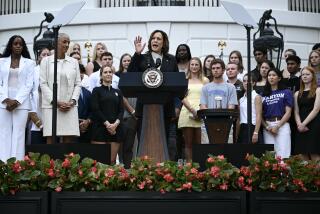Web-Savvy Staff Helps Dean Weave His Way Up
- Share via
BURLINGTON, Vt. — In the nerve center of Howard Dean’s campaign headquarters, a sign on the wall says it all: “The revolution will not be televised.”
Instead, staffers say, you should look for it on the Internet.
As Dean kicks off a major fund-raising drive this week, an appeal mounted heavily on the Web, he is expected to easily lead the Democratic presidential pack by raising at least $10 million -- perhaps substantially more -- for the quarter ending Tuesday.
The national buzz over Dean’s fund-raising feats has helped catapult him from obscure former Vermont governor to prime contender for the Democratic nomination.
And behind the scenes, much of the credit goes to a staff of itinerant techies who interrupted their careers, moved to Vermont and started running the Internet operation for Dean that has turned traditional U.S. politics on its head.
They came from across the country, drawn by Dean’s tough criticism of the Bush administration and the belief that an online community of millions could be mobilized. In their former lives, they were rock drummers, attorneys, campaign junkies, Web wizards and writers. All migrated to Burlington in the belief that aggressive use of the Internet would help elect the next president.
“You have to put all this in perspective, because the first primaries are months away and nobody has cast a single vote for Howard Dean or anyone else,” cautioned Bruce Bimber, a political science professor at UC Santa Barbara and coauthor of “Campaigning Online,” a recently published book. “But the people behind his campaign have done things with the Web and politics that no other candidate has achieved to this degree before.”
On a recent morning, the leaders of Dean’s online troops could be found on the third floor of a plain brick building in Burlington, hunched over laptops in a room that looked like a dormitory lounge. The dress was casual, the mood relaxed. But the sense of mission was unmistakable.
“I came out here all the way from Moab, Utah, to work on this campaign,” said Mathew Gross, who runs Dean’s daily blog, or campaign journal. “I didn’t have a job, and they didn’t know who I was. But I had to come here and play a role.”
Nearby, Zephyr Teachout sat at a computer and revised the latest directives for thousands of Dean organizers hoping to organize rallies, house parties and other meetings around the nation. The former North Carolina attorney said she auctioned off all her belongings this year and moved up to Vermont. A veteran campaign worker, she’s the head of online organizing and outreach.
“I couldn’t not be here,” she said. “There’s a lot of people like me here who are fascinated by the Internet, but it’s not that we’re so sophisticated. We’re just using a lot of clumsy tools in a way that’s never been done before in American politics.”
Other candidates are using the Internet, but Dean’s efforts “are quite simply in a class by themselves,” said Carol Darr, director of the Institute for Politics, Democracy and the Internet at George Washington University in Washington. “For sheer magnitude of success and touching base with thousands of people, we really haven’t seen this before.”
Early this year, the Dean campaign had $157,000 cash on hand, seven or eight aides and 432 known supporters nationwide, according to campaign manager Joe Trippi. Last week, the Dean camp announced it had signed up more than 400,000 online supporters.
In some cases, the campaign discovered supporters almost by accident. In the spring, for example, several hundred Dean backers began organizing independently through Meetup.com, a Web site dedicated to linking up people with similar interests to gather once a month. Late last week, the campaign had 113,572 supporters registered on the site, with the total increasing by the hour.
Trippi -- a veteran of five presidential campaigns -- gives maximum credit to such grass-roots efforts. But he added that Dean could not have come out of nowhere so fast without his Web-savvy aides.
“I give ‘em a lot of credit,” he said, gesturing to the hectic room just outside his office. “Each of them in their own way plays a major role. They work with the people who already support us, and they recruit thousands more for the long haul.”
Gross, the blog master, is squeezed into a corner, sitting at a laptop, working with assistants to update the site several times a day. It’s not unusual for him to post commentary well after midnight.
“We’re no longer in a 24-hour news cycle,” he said as he finished posting a recent Field Poll, which showed Dean leading other Democrats in California. “It’s a 15-minute cycle, because we have real-time conversations with people. Fifteen minutes is the time it takes to write a 200-word message and get it up on the Web.”
Gross’ ability to communicate quickly got him his job. When he first walked into the headquarters unannounced in March, staffers looked at him suspiciously. When he walked into Trippi’s office, some tried to escort him out of the building. But then Gross blurted out that he had written for a political blog that Trippi knew and liked.
“I told him if he could get a blog up and running for us in 24 hours, he’d have a job,” Trippi said.
Gross came through, creating a rough version of the journal that is now read by 35,000 people each day, according to campaign officials.
Teachout, the former North Carolina attorney, described the Internet as a tool for organizing, not some holy grail. Yet she talked about the political changes it can trigger in almost reverential tones.
“The revolution comes in phases,” she said matter-of-factly, taking a quick afternoon break. Noting that many Dean supporters found each other through discussion groups on the Web that were not associated with the campaign, she added, “Soon, all these people are in touch with us -- but they’re also hosting their own fund-raisers. They’re printing their own campaign posters and organizing their own rallies. If that happens on a national scale, it changes politics forever.”
Across the room, the staffers running DeanTV are putting new video clips of a recent campaign rally in Portland, Ore., on the Web; the newly launched service can be downloaded on most computers and feeds regular programming to supporters.
“All of this stuff is pretty new to politics,” said Web master Nicco Mele, who designed the campaign’s Web site and was updating it for the umpteenth time that day.
Amid the confusion, Mele was asked what he thought the next big thing might be in the confluence of Web technology and politics.
“All of this new tech stuff bubbled up from the ground, and since people were doing things, we just listened,” he said, reinforcing the campaign’s mantra that new ideas flow upward from the grass-roots.
“I guarantee you that the next big Internet thing won’t be invented in a room like this. Nobody just dreams up a revolution.”
More to Read
Get the L.A. Times Politics newsletter
Deeply reported insights into legislation, politics and policy from Sacramento, Washington and beyond. In your inbox twice per week.
You may occasionally receive promotional content from the Los Angeles Times.










